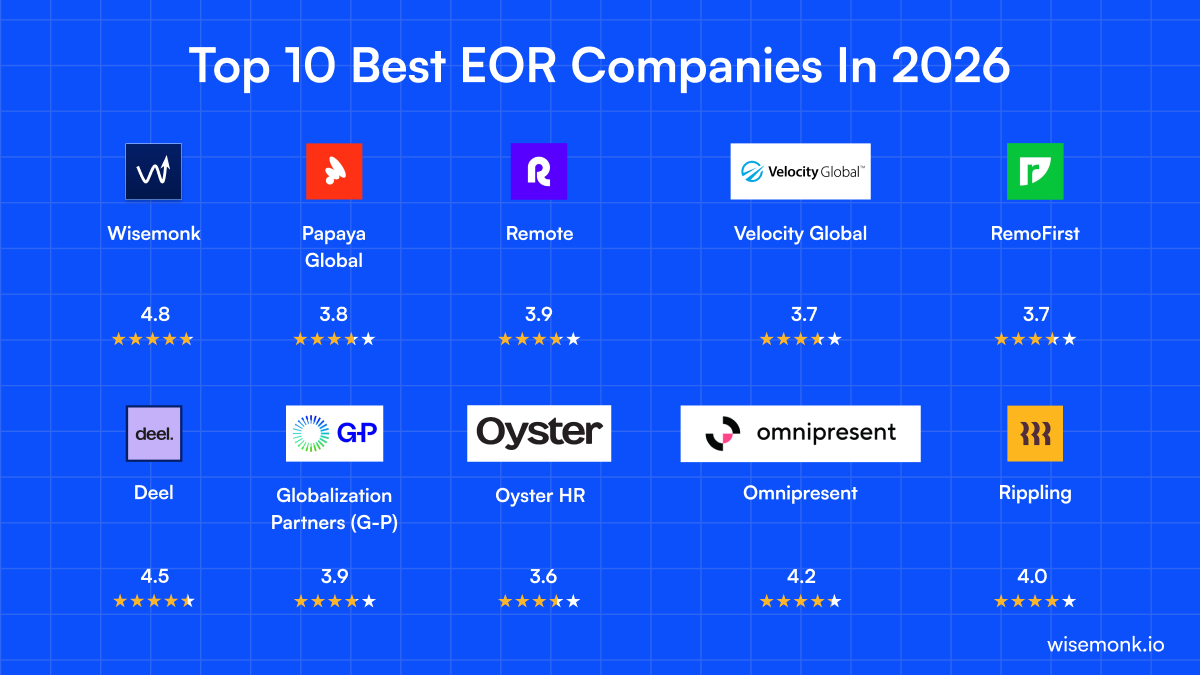Looking to hire employees in Brazil but finding the complex labor laws overwhelming? Brazil offers vast opportunities for both local and international employers, but its intricate employment regulations and payroll taxes require extensive knowledge to ensure compliance. This guide breaks down how using an Employer of Record in Brazil simplifies hiring, ensures full compliance with Brazilian labour laws, and helps you swiftly access top Latin America talent, without the cost or hassle of setting up a local entity.
What are the main Brazilian employment law Frameworks?[toc=Employment Law Frameworks]
From what we’ve seen working with global businesses, hiring in Brazil is unlike anywhere else. The country is known for strong worker protections and a long list of mandatory benefits, and when it comes to compliance, there’s no room for shortcuts. So, what really sets Brazilian employment apart? Let’s break it down:
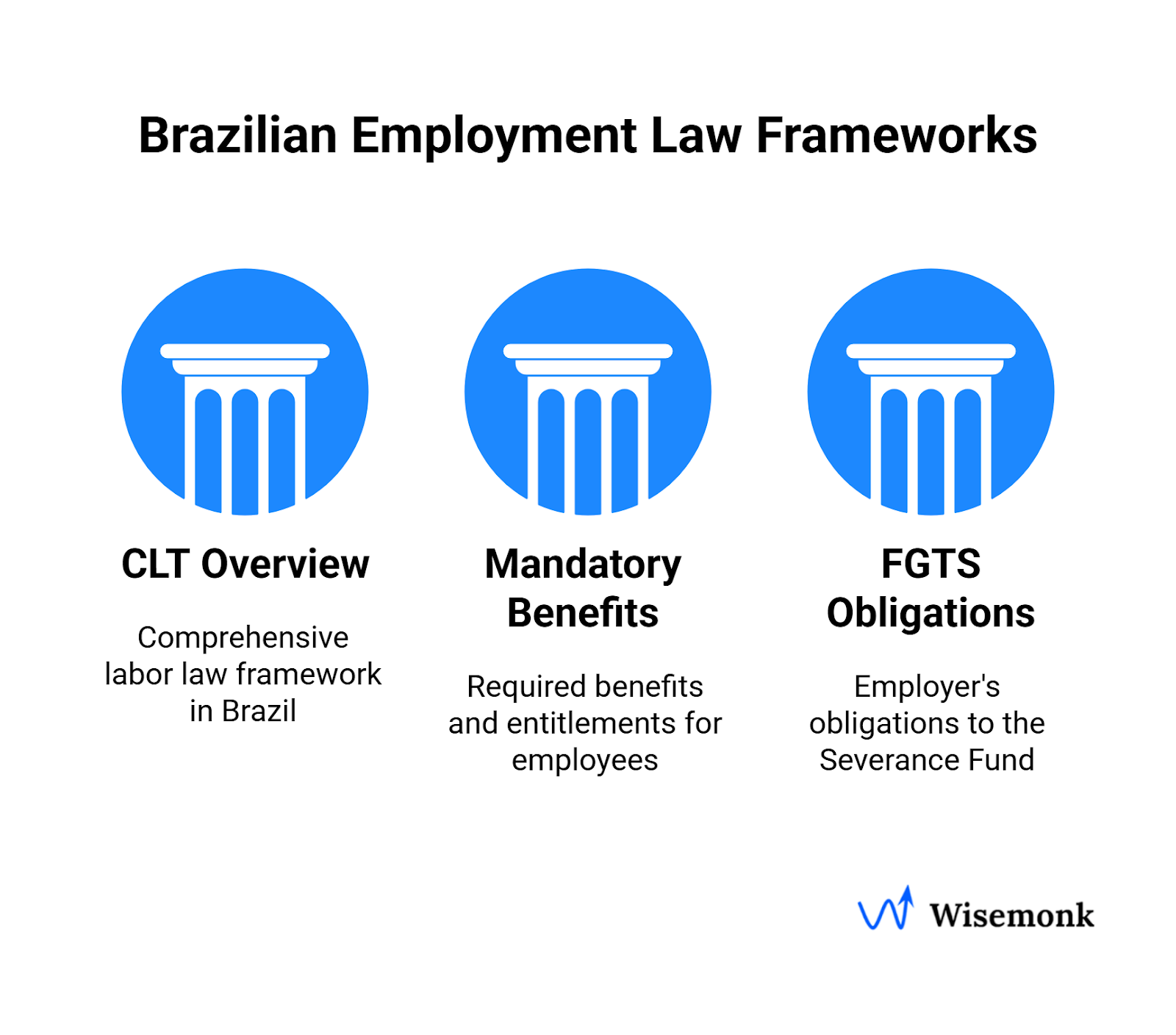
- CLT (Consolidação das Leis do Trabalho) Overview
- The CLT standardizes employment contracts, working hours (generally 44/week), overtime, holidays, vacation, and terminations.
- Applies to nearly all employees.
- Mandatory Benefits and Entitlements
- At least 30 days of paid annual vacation.
- Meal and transport vouchers. (learn more)
- A 13th salary, paid as an extra month's wage.
- The 13th salary is a mandatory bonus, paid in two installments at year-end.
- Employees on vacation are entitled to a one-third extra bonus.
- FGTS (Severance Fund) Obligations
- Employers must pay 8% of salary into the FGTS, a severance fund that protects employees upon termination.
Together, these regulations make Brazil’s employment environment highly structured, with predictable entitlements and significant compliance responsibilities for any company operating in the country.
What are the Key Benefits of using EOR Services in Brazil?[toc=Key Benefits of Using an EOR]
Given those rules, setting up a local entity for hiring workers in Brazil is no small task. That’s why more businesses turn to Employer of Record (EOR) solutions to manage payroll, contracts, and tax regulations. Here’s what you gain:
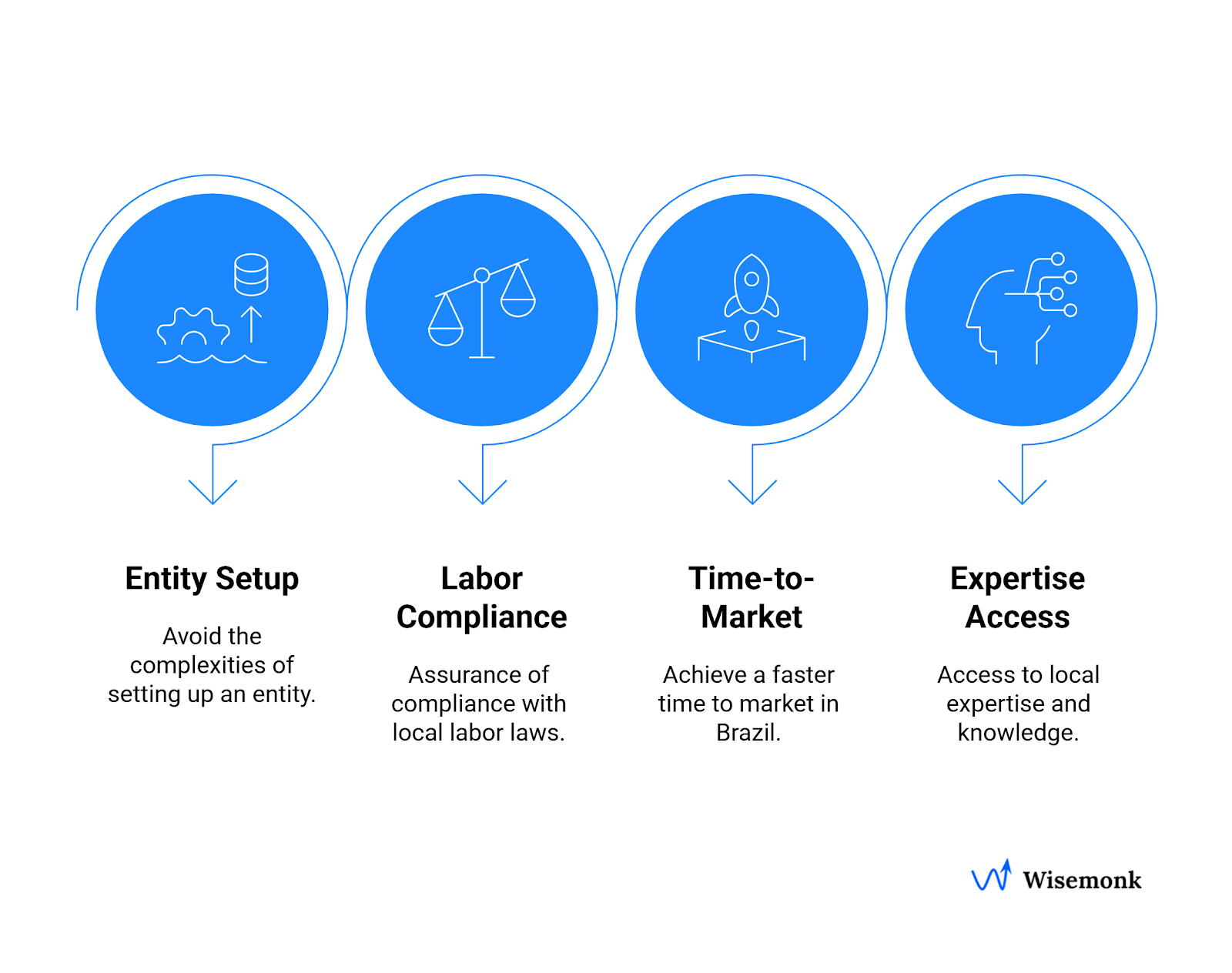
- No Local Entity Required: EOR solutions allow you to hire full-time employees and international employees as your legal employer of record in Brazil, bypassing the need for a local entity while managing local labor laws.
- Payroll Management & Tax Compliance: EOR providers oversee payroll management, payroll taxes, employee benefits, social security contributions, and reporting, filing everything in line with Brazilian law, collective bargaining agreements, and Brazilian government requirements.
- Faster Onboarding Process: You can have new employees legally employed and ready to work in a matter of days, versus months through traditional company formation.
- Ensure Compliance: EORs hold extensive knowledge of complex labor laws and ensure compliance with statutory benefits, labor court precedents, and current Brazilian labour laws, even when hiring foreign employees and navigating disability benefits, health insurance, and maternity leave rules.
- Access to Local Expertise: Leverage professionals with deep insights into local laws, union requirements, employment contract standards, and competitive benefits in the Brazilian market.
What are some considerations while hiring in Brazil using Employer of Record (EOR)?[toc=Considerations]
Before onboarding new employees or foreign workers, it’s important to handle:
- Registration requirements: Ensure all employees in Brazil have a valid CPF number, and businesses operating payroll must hold a CNPJ (company tax ID), as required by the Brazilian government.
- Social Security & Public Pension Fund: Both employer and employees contribute to the INSS. This covers retirement, sick leave, disability benefits, and pension claims, mandatory for all employees in Brazil.
- Union and labor court rules: Most Brazilian employees are covered by a union. EORs handle negotiation compliance, ensuring employment contracts observe collective bargaining agreements (CCT) that set standards for minimum wage, overtime, sick leave, and health insurance.
- Employee Termination & Severance: Brazilian law mandates formal notice periods, severance pay including FGTS, and sick leave payout, often overseen by union representatives or the labor court.
How does payroll and tax compliance work in Brazil with EOR services?[toc=Payroll & Tax Compliance]
Once you’ve navigated hiring agreements and employment contracts, payroll management is your ongoing responsibility. Every step must follow evolving employment regulations and local tax regulations, or face costly penalties.
- Federal, State, and Municipal Taxes: Employees and companies are subject to IRPF (income tax), INSS (social security), and several local taxes.
- eSocial Reporting Requirements: All employment actions must be reported electronically through the government eSocial portal, ensuring real-time data flow.
- Monthly and Annual Compliance Deadlines: Payroll, tax, and benefit filings adhere to strict monthly/annual deadlines, with significant penalties for non-compliance.
- Audit Preparation and Support: EORs offer audit-ready recordkeeping and document archiving.
What Employee Benefits and Entitlements Are Legally Required in Brazil?[toc=Employee Benefits]
Competing for talent in Brazil isn’t just about salary, statutory and competitive benefits matter for all employees in Brazil.
- Statutory benefits: 13th salary, 30 days’ paid annual leave, meal and transport vouchers, FGTS, INSS, and paid sick leave are non-negotiable.
- Health insurance: Many roles require supplemental insurance by union rules, especially for pregnant employees or under specific collective bargaining agreements.
- Profit-sharing and bonuses: Large employers often offer PLR (profit-sharing plans) for tax efficiency and retention.
- Disability, parental, and sick leave: Brazilian labor laws are clear, provide top-up for INSS sick leave pay, paid maternity leave, and adjust benefits for male employees/family needs as determined by labor law.
How Does the Hiring and Onboarding Process Work in Brazil?[toc=Hiring & Onboarding Process]
With your benefit strategy set, the next challenge is a compliant, quick onboarding process. Here’s a typical step-by-step:
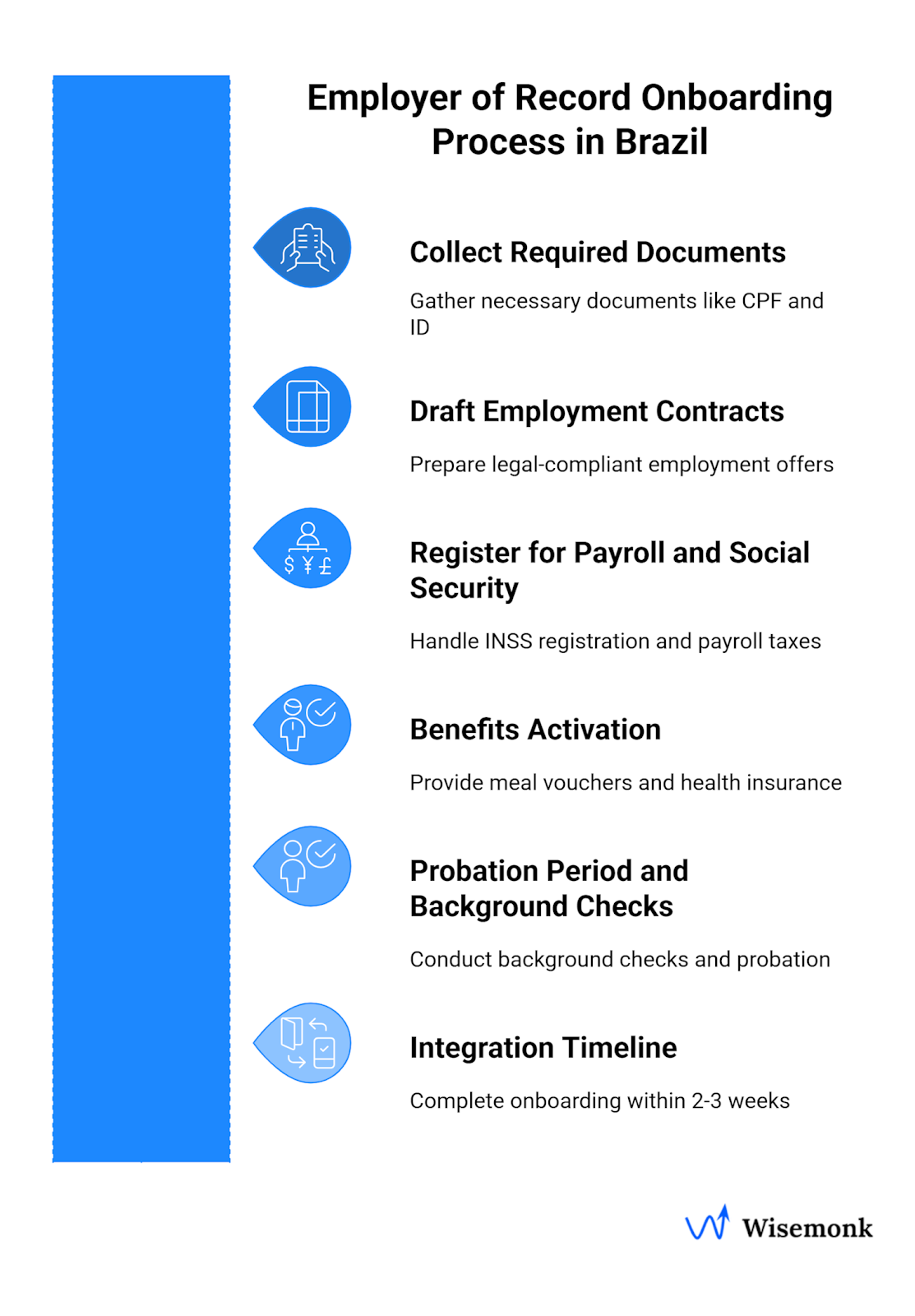
- Collect required documents: CPF, ID, diplomas, contracts for foreign employees.
- Draft employment contracts: EOR prepares legal-compliant offers matching Brazilian employment laws, CCTs, and company rules.
- Register for payroll and social security: EOR handles INSS registration, files with eSocial, and sets up payroll taxes.
- Benefits activation: Meal/transport vouchers, health insurance, and other statutory benefits are provided from day one.
- Probation period and background checks: Contracts may include a probation period (up to 90 days); standard background checks are performed.
- Integration timeline: Most new employees are fully onboarded within 2–3 weeks if all documents are prepared.
How to manage a Brazilian workforce remotely with Employer of Record?[toc=Brazil Workforce Management]
When your team spans cities or even borders, oversight is key. An EOR is your extension on the ground for both managerial and compliance needs:
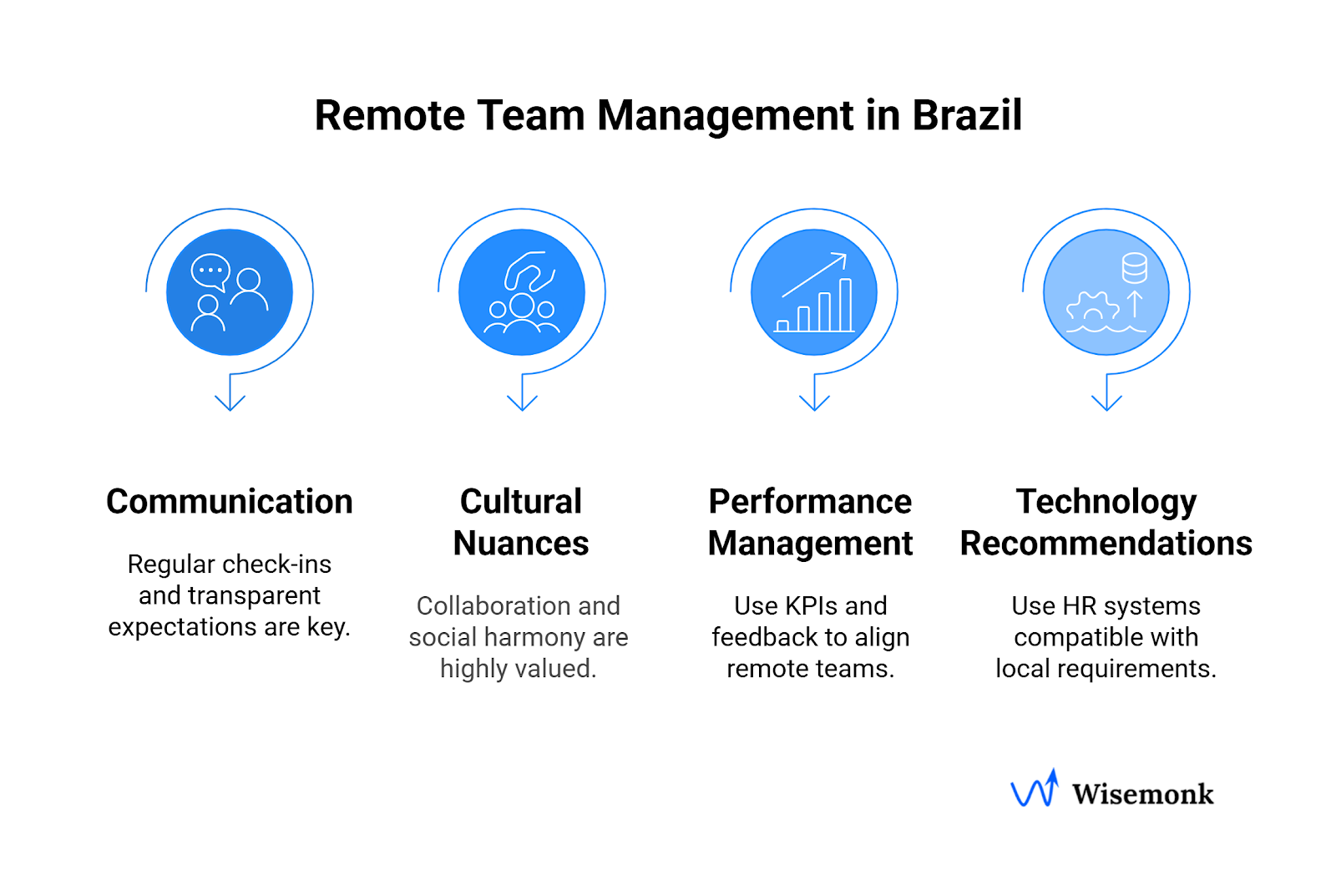
- Communication Best Practices: Use regular bilingual check-ins, transparent expectations, and consistent processes.
- Cultural Considerations: Brazil values collaboration and social harmony; trust and directness are built through personal connection.
- Performance Management Strategies: Clear, measurable KPIs and feedback routines align remote teams with local expectations.
- Technology and Tool Recommendations: Select HR and payroll systems that are compatible with eSocial and support local tax and benefits requirements.
What Should You Consider for Cost Analysis and Budgeting in Brazil?[toc=Cost Analysis & Budgeting]
Budgeting for Brazilian labor costs is about more than salary; every employer must factor extensive benefits, taxes, and unforeseen fees. Careful budgeting is essential for global expansion. Here’s what to include:
Conclusion[toc=Conclusion]
If you’re planning market entry into Brazil, success comes down to being prepared, compliant, and strategic. In our experience guiding global companies, the most effective approach is to:
- Leverage a reputable EOR to handle Brazilian labor regulations, payroll, and complex union rules.
- Prioritize detailed planning for benefits, taxes, and timelines to stay on budget and avoid hidden costs.
- Rely on local expertise to adapt your approach as laws and market conditions evolve.
Focus on compliance from day one, set clear goals, and work closely with specialists who understand both the local culture and regulatory environment. That’s how you turn Brazil’s promise into real, sustainable growth.
Ready to expand your global business quickly and compliantly? Partner with Wisemonk’s Employer of Record services to effortlessly manage hiring, payroll, and compliance, so you can focus on growing your business with confidence.
Frequently asked questions
What are the mandatory benefits for employees in Brazil?
Employees must receive paid annual leave, a 13th salary (extra month’s pay), FGTS deposits, meal and transport vouchers, and health coverage if specified by union agreements.
How does the 13th salary work through EOR?
The EOR pays the 13th salary in two separate installments, usually in November and December, with all required taxes handled in compliance with labor law.
What happens during employee termination in Brazil?
Termination requires a formal notice, payment of all remaining rights (like unused vacation, 13th salary, FGTS), and may involve union or government approval steps.
Are there industry-specific regulations to consider?
Yes, most jobs are covered by union agreements, which often add special benefits, set minimum pay, or require additional procedures beyond general labor laws.
How long does it take to hire someone through EOR in Brazil?
With ready documents, the hiring and onboarding process through an EOR typically takes about 2–3 weeks from offer acceptance to full integration.
What is the employer tax in Brazil?
Employers in Brazil pay taxes such as social security contributions (INSS), FGTS (severance fund), and other payroll-related levies, which vary by sector and employee salary.
What are the payroll laws in Brazil?
Payroll in Brazil must comply with local labor laws, including employment contracts, minimum wage, working hours, overtime, social security contributions, vacation, and severance requirements.
.png)
.png)
%20(1).webp)
